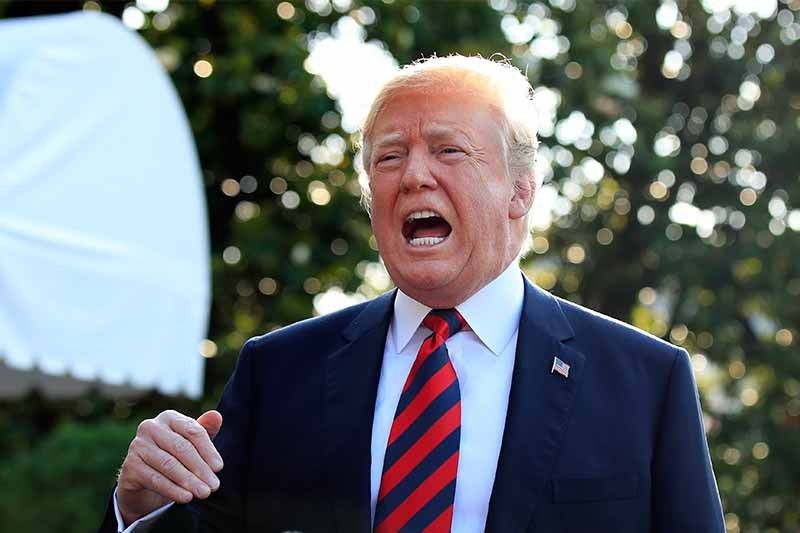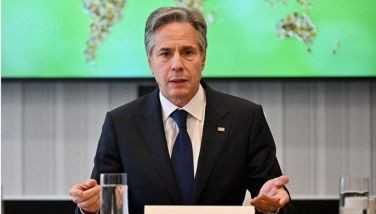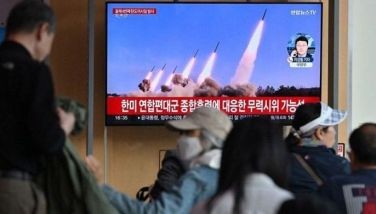Trump says 'let Russia back in' as he heads for G-7 summit

LA MALBAIE, Quebec — President Donald Trump injected fresh drama into an already tense meeting of the Group of Seven major industrialized nations Friday, calling for Russia, ousted for its the annexation of Crimea, to be reinstated.
Trump made the comment at the White House Friday after hours of further escalating his rhetoric against longtime allies over U.S. trade practices.
"Why are we having a meeting without Russia in the meeting?" Trump asked. "They should let Russia come back in because we should have Russia at the negotiating table."
Solidifying his solo status on the world stage, Trump also lashed out at longtime allies over their criticism of his trade policies. He plans an early exit from the G-7 meeting.
Russia was ousted from the elite group in 2014 as punishment for President Vladimir Putin's annexation of Crimea and its support for pro-Russian separatists in Ukraine. In the U.S., special counsel Robert Mueller is investigating whether Trump's campaign colluded with Russia in a bid to sway the 2016 presidential election in his favor.
Trump will arrive Friday at the annual gathering, held this year at a Quebec resort, but will leave Saturday morning before the event is over, heading to Singapore for his highly anticipated summit with North Korean leader Kim Jong Un. The White House announced his travel plans after French President Emmanuel Macron and Canadian Prime Minister Justin Trudeau signaled they would use the G7 event to take a stance against new U.S. tariffs on steel and aluminum imports.
At a joint press conference on Thursday, Macron said: "A trade war doesn't spare anyone. It will start first of all to hurt U.S. workers." Trudeau said: "We are going to defend our industries and our workers."
Trudeau, for his part, said Trump's action would hurt American workers as well as Canadians.
"If I can get the president to actually realize that what he's doing is counterproductive for his own goals as well, perhaps we can move forward in a smarter way," Trudeau said.
As tempers frayed, Trump had a ready retort, via tweet: "Please tell Prime Minister Trudeau and President Macron that they are charging the U.S. massive tariffs and create non-monetary barriers. The EU trade surplus with the U.S. is $151 Billion, and Canada keeps our farmers and others out. Look forward to seeing them tomorrow."
Later Thursday, Trump tweeted: "Prime Minister Trudeau is being so indignant, bringing up the relationship that the U.S. and Canada had over the many years and all sorts of other things...but he doesn't bring up the fact that they charge us up to 300% on dairy — hurting our Farmers, killing our Agriculture!"
A few hours later, he added, "Take down your tariffs & barriers or we will more than match you!"
With a cool reception all but assured, Trump has complained to aides about even having to attend the meeting, especially since his summit with Kim is just days away. Late Thursday, the White House announced that Trump would be leaving the G-7 late Saturday morning to head to Singapore ahead of his summit with Kim, though the G-7 meeting was scheduled to last until later that day.
Trump will skip out on G-7 meetings about climate change, clean energy and ocean protection.
This marks Trump's second summit of the G-7, an informal gathering every year under a rotating chairmanship. The member countries are Canada, France, Italy, Japan, Germany, the United States and Britain. The European Union also attends. Trump is set to hold a series of group and one-on-one meetings, including with Trudeau and Macron.
Under Trump, the United States has abandoned its traditional role in the G-7. His predecessors pressed for freer global trade and championed a trading system that required countries to follow World Trade Organization rules. Trump's policies have been more protectionist and confrontational, driven by a perception that the U.S. has been the victim of poorly conceived trade deals.
Relations have hit such a low that a key question now is whether the seven countries can agree on a joint statement of priorities at the conclusion of the meeting. A gathering of G-7 finance ministers days earlier concluded last week with a message of "concern and disappointment" about Trump from the other six countries. France's finance minister described the group as "far more a G-6 plus one than a G-7."
Macron said Thursday on Twitter, "The American President may not mind being isolated, but neither do we mind signing a 6 country agreement if need be."
Tension has been building over a year of policymaking that has distanced the U.S. from traditional allies, including Trump's decisions to withdraw the U.S. from the Paris climate accord and the international Iran nuclear agreement. His new tariffs — 25 percent on imported steel and 10 percent on aluminum from Canada, Mexico and the European Union — threaten to drive up prices for American consumers and companies and heighten uncertainty for businesses and investors around the globe.
Canada and other U.S. allies are retaliating with tariffs on U.S. exports. Canada is waiting until the end of the month to apply them with the hope the Trump administration will reconsider.
Meanwhile, talks to renegotiate the North American Free Trade Agreement that eliminated most tariffs and duties between the U.S., Canada and Mexico appear to have ground to a halt. Trump injected further uncertainty recently when he floated the idea of replacing NAFTA with two separate trade deals, one with each country.
Critics argue that the growing U.S. isolation is risky at a time when Trump is making diplomatic overtures with North Korea and in the Middle East and could use the support of allies.
Sebastian Mallaby, a senior fellow with the Council on Foreign Relations, described the relationships between the U.S. and the rest of the G-7 as at a "new level of crisis," saying that it was not just about trade but "a general U.S. attitude toward the system."
Despite the conflict, Mallaby predicted that the countries would still seek to work with the U.S., calling it "the indispensable country."
Likewise, Macron described the moment as a period of "great challenges," but also defended his efforts to befriend the American president, saying the U.S. is a historical ally and "we need them."
___
Lucey and Miller reported from Washington.
- Latest
- Trending
































